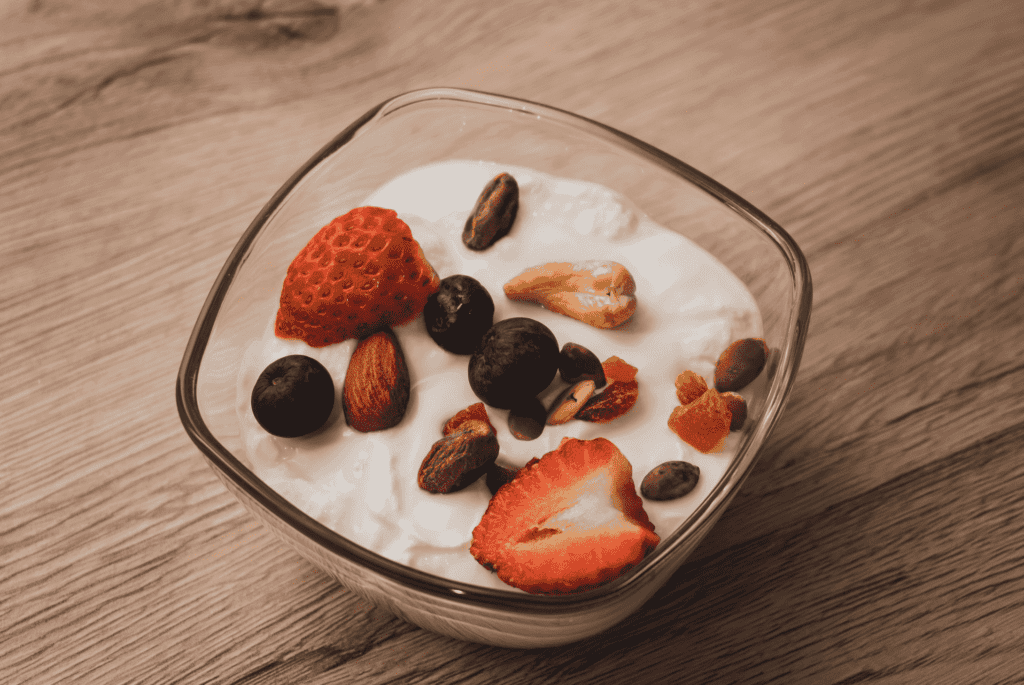Your gut is made up of trillions of bacteria. Collectively, that bacteria is called the microbiome and it plays a crucial role in your overall health. What you eat directly influences the makeup of your microbiome, so it’s important to fuel your gut with the right nutrients and bacteria.
What are probiotics?
The most common gut-friendly foods are full of probiotics and prebiotics. Probiotics are “good” bacteria that offer many health benefits. They help make foods more digestible and can mainly be found in fermented foods. One of the most common probiotics is lactobacillus.
What are prebiotics?
Once you have probiotics in your body, you need to fuel them. Prebiotics are important for gut health because they provide fuel for the probiotics. Prebiotics are a specialized plant fiber that can only be digested by gut bacteria. You can think of prebiotics as a fertilizer that stimulates the growth of healthy gut bacteria.
A diet full of fruits, vegetables, nuts, seeds, and fermented foods can help balance the microbiome. Below are 5 foods that can improve your gut health:
1. Yogurt
Yogurt is full of natural probiotic cultures that can strengthen and improve your digestive tract. Some studies have shown that people who eat yogurt have more lactobacilli in their intestines. Make sure you’re buying sugar-free, full-fat versions of yogurt so you can get all of the nutrients.
2. Sauerkraut
Our guts love fermented foods. Sauerkraut is a finely cut cabbage that is fermented by various lactic acid bacteria. The origins of sauerkraut date over 2,000 years ago back to China. Sauerkraut has a bit of a sour flavor and a long shelf life. The fermentation process allows for the growth of lots of really beneficial gut bacteria. The probiotics in sauerkraut can help improve your gut balance and keep the lining of your digestive system happy.
3. Kefir
Kefir is a fermented drink traditionally made by using either cow’s milk or goat’s milk. This tangy and tart beverage has a consistency similar to a yogurt-drink. The flavor of kefir is dependent on the length of time of the fermentation process. It’s made by adding kefir culture (also known as kefir grain) to milk and then letting it ferment for 24 hours. After the fermentation process is complete, the kefir is strained to remove the grains.
Despite being similar to yogurt, kefir has more probiotics and contains up to 60 different strains of bacteria and yeast. The diverse bacteria in kefir can reduce flatulence and alleviate upset stomachs.
Though they’re not quite popular (yet!), dairy-free kefir can be created using coconut water, coconut milk, or even plain water. These options don’t have the same nutrients as regular kefir, but they can be just as good for your gut.
4. Kimchi
Kimchi is a traditional Korean dish made from fermented vegetables. Typically, kimchi is made up of cabbage, vegetables, and seasonings such as salt, sugar, onions, chili peppers, ginger, and garlic. Kimchi originated over 3,000 years ago and was first created to preserve vegetables over long periods of time. Kimchi is a flavorful food and if made properly, it can preserve vegetables for an entire year.
The same lactobacilli bacteria found in yogurt and kefir is also found in kimchi. Eating kimchi can improve the bacteria balance in your gut and improve your overall digestion.
5. Berries
Last but not least on our list of gut-friendly foods is our first non-fermented food— berries! Not only are berries delicious, but they’re also great for gut health. Though berries don’t have probiotic properties to them, they’re full of really beneficial prebiotics.
Berries are also full of soluble fiber, which is important for good digestive health. Berries can contribute to a healthy digestive tract when they’re incorporated into a balanced diet.
The bottom line.
Having a healthy gut is important. If you’re looking to improve your gut health, try sticking to a diet full of probiotics, prebiotics, nuts, and seeds. If you’re struggling with an unbalanced microbiome, try reducing the amount of artificial sweeteners, alcohol, sugar, and salt from your diet. Don’t hesitate to reach out if you have any questions about your gut!
